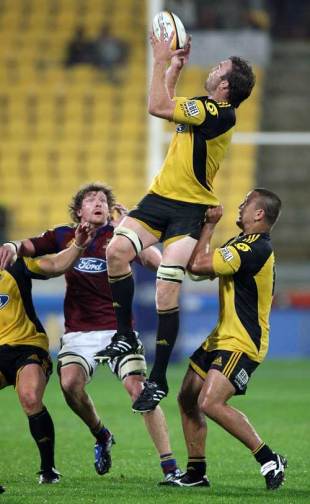|
Comment
Ignore fans at your peril
Huw Turner
February 23, 2009

The Hurricanes' Jason Eaton claims a high ball flanked by row upon row of empty seats at the Westpac Stadium
© Getty Images
Enlarge
Two items of European rugby news could be used to excuse and explain the long and loud guffaws of laughter emanating from rugby watchers in New Zealand this week. The first was Marc Lievremont's understandable and justifiable objections to the timing of next weekend's France v Wales Test in Paris, 9.00pm on a Friday evening. There have been well-aired objections from fans and journalists over the past few months, but this was the first I had read from one of the combatants directly affected by this absurd piece of programming. New Zealand rugby followers have long had to endure the demands of the advertisers and the needs of News Corporation, which owns Sky TV, which effectively owns Super and Tri Nations rugby. There was a time, in the good old days of amateur rugby and the much-lamented and much-missed days of long tours when the All Blacks toured the UK , or the Lions toured New Zealand, when the rugby was only ever played during daylight hours - well, more or less. Back then New Zealand had no experience of floodlit rugby and, in any case, how could you expect the punters in Christchurch and Dunedin, in particular, to turn out on a cold winter's night when a gale blowing off the Antarctic is not that unusual. The last daytime Test match in New Zealand was in 2001, at Wellington's Westpac Stadium, when John Eales famously booted the Wallabies to victory over Todd Blackadder's All Blacks side. The same stadium, incidentally, where Ireland played last June amidst such a frigid southerly that Brian O'Driscoll, clearly frozen to the bone, was incoherent and incapable of conducting one of those ridiculous on-field, immediate post-match interviews. He had just played 80 minutes of full-blooded Test match rugby which might have warmed him up a little. Just imagine what the spectators must have felt like. Their plight was reflected in the empty seats not only at that Test match but at others in New Zealand later in the season. In the midst of a wonderful New Zealand summer, Super 14 has got underway to the backdrop of poorly filled stadia. Last Friday's derby between the Hurricanes and the Highlanders was dominated by the sight of empty yellow seating, the atmosphere conspicuous by its absence. In previous times Wellington would have played Otago and the off-field spectacle would have been raucous and seething. There are a number of reasons why punters have been turned off professional rugby in the last five years, but principal amongst them is the contemptuous way that they have been treated by the fixture programming of the authorities. The impression has been given that spectators don't count but spectators have their means of taking retribution. The second piece of news was the reported transfers, and the reaction to these reports, of England-qualified players James Haskell, Tom Palmer and Riki Flutey to French clubs at the end of the 2008/9 season. This player-drain is not a new phenomenon, it is not even a symptom of the professional era, although it has an increasingly global dimension, not unlike other aspects of national and international economies as the latest recession intensifies. In the amateur days, for example, Welsh rugby was regularly plundered by English rugby league. Riki Flutey is just the latest and, for the moment, most high-profile example of a New Zealand rugby mercenary seeking employment from the highest bidder. Good luck to him, I suppose, but the effects of his actions, and countless others who have either migrated to Europe or disappeared into the black hole of Japanese rugby, upon New Zealand rugby have been well documented over the past five years. From down here it seems like the English and French club owners have been allowed to plunder Pacific nations' playing stocks (and I include New Zealand and Australia among that number) with scant regard to the consequences for international rugby. Now that the fortunes of the English and French national sides have come under scrutiny, and the control their national bodies exert over their domestic games is under question, does this mean that the problem of player-drain will be taken seriously and perhaps addressed? Nothing has been more damaging to the reputation of international rugby than the sight of Jamie Joseph appearing for Japan, Shane Howarth for Wales, Tony Marsh for France and Lesley Vainikolo for England. Flutey's signing for Brive emphasises the cynicism of the European club power brokers and those complicit in their transactions. © Scrum.com
|
Live Sports
Communication error please reload the page.
-
Football
-
Cricket
-
Rugby
-
- Days
- Hrs
- Mins
- Secs
F1 - Abu Dhabi GP
Abu Dhabi Grand Prix December 11-131. Max Verstappen ()
2. Valtteri Bottas (Mercedes)
3. Lewis Hamilton (Mercedes)
4. Alexander Albon ()
5. Lando Norris ()
6. Carlos Sainz Jr ()
-
ESPNOtherLive >>
Snooker - China Open
Tennis - Miami Open

